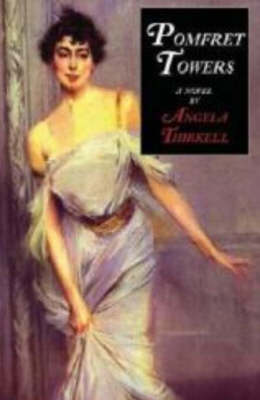
Pomfret Towers, Barsetshire seat of the earls of Pomfret, was constructed, with great pomp and want of concern for creature comforts, in the once-fashionable style of Sir Gilbert Scott's St Pancras station. It makes a grand setting for a house party at which gamine Alice Barton and her brother Guy are honoured guests, mixing with the headstrong Rivers family, the tally-ho Wicklows and, most charming of all, Giles Foster, nephew and heir of the present Lord Pomfret. But whose hand will Mr Foster seek in marriage, and who will win Alice's tender heart? Angela Thirkell's classic 1930s comedy is lively, witty and deliciously diverting.
This is the 3rd Angela Thirkell I've read so far (and finished - I DNF'd one last year), and it is, by far, the most biting, painfully hilarious of the lot yet. I say painfully because all those moments you wish would happen in books, when the evil/nasty/rude character is at work, happen in this book. But I almost dnf'd this one too, because it doesn't start off well at all.
At the opening, it appears that the narrative (3rd person omniscient, btw) is going to focus primarily on Alice Barton, a character so Mary Sue that the Mary Sue trope should have been named Alice Barton. She is ridiculous; frankly, she's barely functioning. As I write this, it occurs to me that in current times, she might have been thought to be agoraphobic; she isn't, she's just terrified of everything beyond belief.
Fortunately the biting humor was making me laugh or giggle too often, so I kept on and discovered the story rapidly becomes an ensemble, and even though Alice continues to get more page time than the rest, her growing confidence makes her a tiny bit more bearable. Tiny bit. Fair warning, by the end of the book she's still pretty ridiculous.
But along the way, Thirkell does something interesting with Alice; something very unexpected from what I know of her Barsetshire books. She uses Alice's character to sniff around the edges of masochism and emotional abuse. Just the edges, mind you; events that would seem inconsequential or pathetic on their own start to add up to a disturbing pattern, and Thirkell writes a scene or two where her friends discuss her pattern of behaviour quite frankly. This doesn't go anywhere, of course; this book's destiny was to be a frivolous, entertainment, so of course everything works out in the end. But given the time it takes place (~1930), I found it to be an unexpected and interesting thread and raised the story's merit in my estimation.
The end was a tad trite, and could only be expected, but my rating stands because, man, this book was funny.
Reading updates
-
Started reading
-
19 January, 2018:
Finished reading
-
19 January, 2018:
Reviewed
